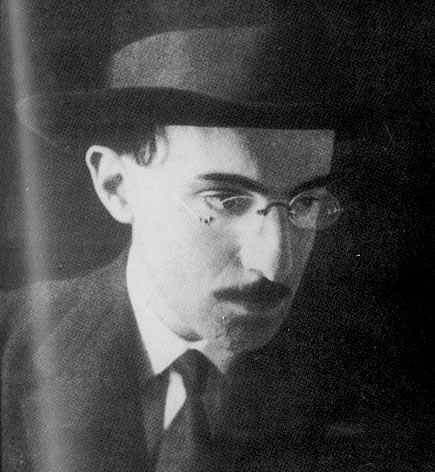Dzieło
Księga niepokoju
Fernando PessoaFernando Pessoa słynne cytaty
Fernando Pessoa Cytaty o myślach
Fernando Pessoa cytaty
Fernando Pessoa: Cytaty po angielsku
Os sentimentos que mais doem, as emoções que mais pungem, são os que são absurdos – a ânsia de coisas impossíveis, precisamente porque são impossíveis, a saudade do que nunca houve, o desejo do que poderia ter sido, a mágoa de não ser outro, a insatisfação da existência do mundo. Todos estes meios tons da consciencia da alma criam em nós uma paisagem dolorida, um eterno sol-pôr do que somos.
The Book of Disquietude, trans. Richard Zenith, text 196
Repudiei sempre que me compreendessem. Ser compreendido é prostituir-se. Prefiro ser tomado a sério como o que não sou, ignorado humanamente, com decência e naturalidade.
Źródło: The Book of Disquietude, trans. Richard Zenith, text 128
“Literature is the most agreeable way of ignoring life.”
A literatura é a maneira mais agradável de ignorar a vida.
Wariant: To write is to forget. Literature is the pleasantest way of ignoring life.
Źródło: The Book of Disquietude, trans. Richard Zenith, text 116
“In order to understand, I destroyed myself.”
A Factless Autobiography, Richard Zenith Edition, Lisbon, 2006, p. 73
The Book of Disquiet
Oryginał: Para compreender, destruí-me.
Não sou nada.
Nunca serei nada.
Não posso querer ser nada.
À parte isso, tenho em mim todos os sonhos do mundo.
Álvaro de Campos (heteronym), Tabacaria ["The Tobacconist's" or "The Tobacco Shop"] (15 January 1928)
Variant translations:
I am nothing.
Never shall be anything.
Cannot will to be anything.
This apart, I have in me all the dreams of the world.
trans. Jonathan Griffin, in Selected Poems (Penguin Books, 1974), p. 111
I am not nothing.
I will never be nothing.
I cannot ever want to be nothing.
Apart from that, I have in me all the dreams of the world.
In Webster's New World Dictionary of Quotations (2005), p. 649
I am nothing.
I shall never be anything.
I cannot even wish to be anything.
Apart from this, I have within me all the dreams of the world.
Wariant: I am nothing.
I will never be anything.
I cannot wish to be anything.
Bar that, I have in me all the dreams of the world.
“I wasn’t meant for reality, but life came and found me.”
Źródło: The Book of Disquiet
“To know nothing about yourself is to live. To know yourself badly is to think.”
Źródło: The Book of Disquiet
“No intelligent idea can gain general acceptance unless some stupidity is mixed in with it.”
Não há nenhuma ideia inteligente que possa ganhar aceitação geral sem ser misturada antes com um pouco de estupidez.
The Book of Disquietude, trans. Richard Zenith, text 104
“There are ships sailing to many ports, but not a single one goes where life is not painful.”
Źródło: The Book of Disquiet
“I'd woken up early, and I took a long time getting ready to exist.”
Źródło: The Book of Disquiet
Para ser grande, sê inteiro: nada
Teu exagera ou exclui.
Sê todo em cada coisa. Põe quanto és
No mínimo que fazes.
Assim em cada lago a lua toda
Brilha, porque alta vive.
Ricardo Reis (heteronym), Ode (14 February 1933), in A Little Larger Than the Entire Universe, trans. Richard Zenith (Penguin, 2006)
Źródło: Poems of Fernando Pessoa
Ibid., p. 249
Oryginał: Adoramos a perfeição, porque não a podemos ter; repugná-la-íamos, se a tivéssemos. O perfeito é o desumano, porque o humano é imperfeito.
Źródło: The Book of Disquiet
Se, depois de eu morrer, quiserem escrever a minha biografia,
Não há nada mais simples.
Tem só duas datas—a da minha nascença e a da minha morte.
Entre uma e outra coisa todos os dias são meus.
Alberto Caeiro (heteronym), "Se, depois de eu morrer" (8 November 1915), trans. Jonathan Griffin.
Źródło: Poems of Fernando Pessoa
“I take with me the conscience of defeat as a victory banner.”
Ibid., p. 79
Oryginał: Levo comigo a consciência da derrota como um pendão de vitória.
Źródło: The Book of Disquiet
“Direct experience is the evasion, or hiding place of those devoid of imagination.”
Ibid., p. 163
The Book of Disquiet
Oryginał: A experiência directa é o subterfúgio, ou o esconderijo, daqueles que são desprovidos de imaginação.
“If you cannot live alone, you were born a slave.”
Ibid.
The Book of Disquiet
Oryginał: Se te é impossível viver só, nasceste escravo.
“My past is everything I failed to be.”
O meu passado é tudo quanto não consegui ser.
Źródło: The Book of Disquietude, trans. Richard Zenith, text 100
Ibid., p. 125
Oryginał: Nunca amamos niguém. Amamos, tão-somente, a ideia que fazemos de alguém. É a um conceito nosso — em suma, é a nós mesmos — que amamos.
Źródło: The Book of Disquiet
“We are two abysses — a well staring at the sky.”
Ibid., p. 48
The Book of Disquiet
Oryginał: Somos dois abismos — um poço fitando o céu.
